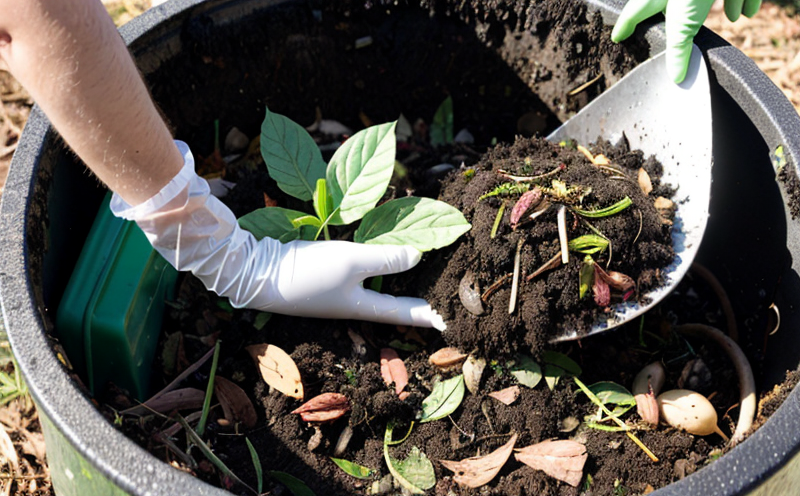ISO 17616 Nitrogen Fixation Microbial Testing in Compost
The ISO 17616 standard is a cornerstone of microbial testing, particularly focusing on the nitrogen-fixing capabilities of microorganisms in compost. This service plays a critical role in ensuring that organic waste products used in agriculture and horticulture are effective and safe to use.
The process involves several key steps, starting with sample collection from the compost batch being tested. Samples must be representative of the entire batch, reflecting the nitrogen-fixing activity across various points within the pile or bin. Once collected, samples undergo rigorous preparation methods designed to protect the microbial community's viability.
Testing itself utilizes a series of incubation steps followed by quantification techniques that measure nitrate production—a direct indicator of effective nitrogen fixation. This is crucial for ensuring that the compost not only provides essential nutrients but also does so in an environmentally friendly manner, minimizing the need for additional chemical inputs during plant growth.
The results are then reported according to ISO 17616 guidelines, which include specific criteria for acceptable microbial activity levels. These standards help ensure consistency and reliability across different laboratories worldwide, making them essential for regulatory compliance and internal quality assurance programs.
Understanding the importance of nitrogen fixation in compost also extends beyond just ensuring product efficacy; it contributes to broader sustainability goals by promoting circular economy principles. By recycling organic waste into valuable soil amendments, we reduce landfill burdens while enhancing soil health—a win-win situation for both industry and environment.
In summary, ISO 17616 microbial testing provides a robust framework for evaluating nitrogen-fixing capabilities in compost products. This not only supports regulatory requirements but also aids companies in meeting their sustainability objectives through scientifically validated methods.
Why It Matters
The significance of ISO 17616 microbial testing cannot be overstated, especially within the context of waste management and compost production. Effective nitrogen fixation is vital for converting atmospheric nitrogen into a form usable by plants, thus enhancing crop yields without relying heavily on synthetic fertilizers.
From an environmental perspective, promoting efficient nitrogen cycling through well-tested composts helps reduce greenhouse gas emissions associated with traditional chemical nitrogen applications. In addition to its ecological benefits, this testing method ensures that compost products meet stringent quality standards set by international bodies like ISO and USDA, thereby fostering trust among consumers and stakeholders.
For businesses involved in waste management or those looking to incorporate compost into their operations, adhering to these rigorous tests can significantly improve brand reputation and operational efficiency. It underscores commitment to sustainability while ensuring product performance meets expectations set forth by regulatory authorities globally.
Eurolab Advantages
At Eurolab, we pride ourselves on providing comprehensive services that go beyond mere compliance; our approach is rooted in innovation and excellence. Our state-of-the-art facilities equipped with advanced analytical instruments guarantee accurate measurements of nitrogen-fixing microorganisms present in compost samples.
We employ experienced technicians who understand both the technical nuances of ISO 17616 requirements as well as practical considerations affecting real-world applications. This combination ensures consistent, reliable results that are not only scientifically sound but also commercially viable for our clients.
Moreover, Eurolab offers flexible service options tailored to meet individual client needs whether they require periodic testing or one-off assessments. Our team works closely with customers throughout the process, offering expert advice on how best to interpret test outcomes in relation to broader business goals.
International Acceptance and Recognition
The ISO 17616 standard has gained widespread acceptance across numerous countries around the world. Its adoption reflects an international consensus on what constitutes effective nitrogen-fixing activity in compost, ensuring consistency regardless of geographical location.
Countries such as Australia, Canada, and parts of Europe have incorporated elements of this standard into their national regulations, recognizing its value in promoting sustainable agricultural practices. Similarly, organizations like the European Commission and various US states cite ISO 17616 when setting guidelines for compost quality assurance programs.
Recognition extends beyond regulatory bodies; many private sector firms also rely on these standards to benchmark their own internal testing procedures against global best practices. This not only enhances confidence in product offerings but also facilitates smoother international trade negotiations involving agricultural inputs.





